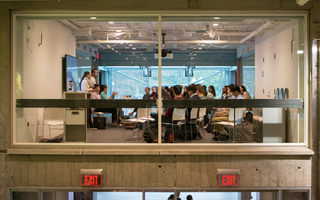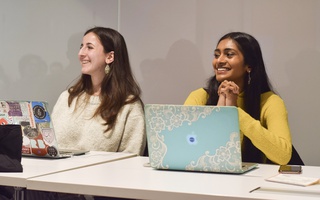{shortcode-5318c447e4ab653dbb5ce90b50e5983334704ae4}
The Undergraduate Council voted to launch pilot programs to provide free laundry detergent and postage stamps to students in the spring semester.
The UC will place 115 bottles of laundry detergent in the Stoughton Hall laundry room — which services five freshman dorms — over the course of the spring semester, according to the Council’s legislation. Representatives said they plan to track usage of the free laundry detergent and will use the data to gauge the potential for future expansion of the program.
Adams House Representative Alexa C. Jordan ’22; Quincy House Representative Phiroze K. Parasnis ’21; Crimson Yard Representative Janna E. Ramadan ’23; and Ivy Yard Representatives David Y. Zhang ’23, Pallas Chou ’23, and Chloe E. V. Koulefianou ’23 co-sponsored the legislation.
The UC received the bottles of ECOS laundry detergent from their manufacturer — Earth Friendly Products — for free, according to Ramadan.
Parasnis said the Council decided to launch the program in the Stoughton laundry room because of its central location on campus.
The UC also voted to allocate $400 to provide postage stamps to students starting in the spring. Undergraduates will be able to receive free stamps at the Harvard Yard Mail Center in the Science Center and some of the upperclassman House mail centers. Dunster House Representative Noah Harris ’22, who sponsored the legislation, said he estimates the funding will cover the costs of roughly 700 stamps and last several semesters.
Harris said he sponsored the legislation because sending mail is important for many activities, and stamps are not currently available at Harvard mail centers.
“Our country relies on stamps and the mailing of paper mail for the electoral as well as a lot of financial processes,” Harris said.
The UC also voted in favor of another bill sponsored by Harris, which prohibits students groups from spending UC funding on plastic foodware, including single-use plastic cutlery, cups, and plates.
Harris, who serves as chair of the UC’s finance committee, said the committee noticed that many student groups use funding to purchase plastic foodware, even though there are biodegradable alternatives available at a comparable price.
“We are doing this to be environmentally friendly and be the best possible stewards of this money that the University gives us,” Harris said.
The UC receives its money from the student activities fee that undergraduates pay annually. During the 2018-2019 academic year, the fee increased from $75 to $200, prompting more students to opt out.
Eliot House Representative Rukmini “Mini” Ganesh ’22 said that though she originally wrote the legislation, she now opposes it because she does not think the Council should tell students how to spend the funding.
“I don’t think that telling people not to buy plastic because we don’t trust them to dispose of it properly is our job,” Ganesh said. “They can make that choice on their own.”
Other representatives, including UC Treasurer Jack M. Swanson ’22, said the council’s finance committee is expressly charged with the task of deciding how to allocate student funding. Swanson noted that the committee’s guidelines prohibit the funding of alcohol, among other items.
— Staff writer Kevin R. Chen can be reached at kevin.chen@thecrimson.com. Follow him on Twitter @kchenx.
Read more in News
Extension School Degree Names 'Academically Wrong,' Dean Says















